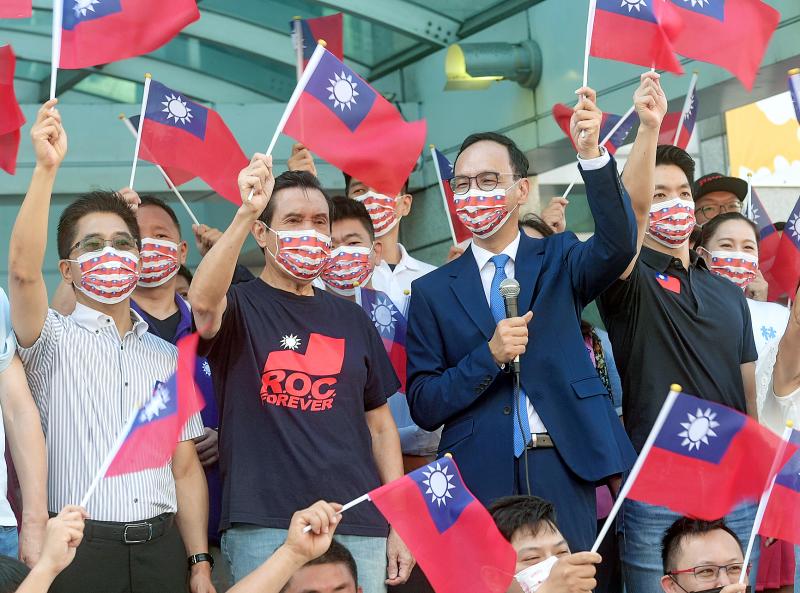The two sides of the Taiwan Strait in their interactions should respect Sun Yat-sen’s (孫逸仙) founding of the Republic of China (ROC) 110 [sic] years ago, Chinese Nationalist Party (KMT) Chairman Eric Chu (朱立倫) said yesterday.
Chu made the remarks at a flag-raising ceremony at the KMT headquarters in Taipei to mark Double Ten National Day.
Over the past 110 years, the ROC has remained unshakable in the midst of turmoil, said Chu, who assumed the role of KMT chairman on Tuesday last week.

Photo: Chang Chia-ming, Taipei Times
“From establishing the Republic of China to defending Taiwan and building Taiwan, the KMT has always stood at the forefront of the people and worked hard for this land,” he said. “We are the political party that loves the Republic of China and Taiwan the most.”
“We will always be believers” of Sun, he said, adding that whether in Taiwan, at home or abroad, all Sun’s believers “must defend the Republic of China, safeguard our freedom and democracy, and firmly guard the peace and prosperity that all our people expect.”
“Both sides of the Strait should uphold this spirit,” he said, adding that the basis of cross-strait relations was seeking common ground while retaining differences of opinion.
It is essential to respect that Sun founded the ROC 110 years ago, he said.
While the ROC was founded on Jan. 1, 1912, it was preceded by the Wuchang Uprising of Oct. 10, 1911.
A responsible ruling party should respect public opinion and defend the ROC, he said.
“Do not distort the history of the Republic of China,” or undermine the efforts past presidents and KMT members, he said.
The ROC is the name of the nation in the Constitution, former president Ma Ying-jeou (馬英九) said at the event.
Since President Tsai Ing-wen (蔡英文) took office five years ago, the “lead role” — the ROC — seems to have taken a “supporting role” in Double Ten National Day celebrations, he said.
Tsai should apologize for the “disappearance” of the Republic of China, he added.
Ma said that the Chinese Communist Party’s separate references to the “1992 consensus” and its “one China principle” over the past six months is an “important message,” as it implies the two statements are not the same.
This indicates that there is space for each side to seek common ground while maintaining differences of opinion, Ma said.
“I have repeatedly said that the ‘1992 consensus’ and ‘one China interpretations are crucial in maintaining cross-strait peace and prosperity,” Ma said.
The “1992 consensus” — a term that former Mainland Affairs Council chairman Su Chi (蘇起) in 2006 admitted making up in 2000 — refers to a tacit understanding between the KMT and the Chinese Communist Party.
Additional reporting by CNA

Nipah virus infection is to be officially listed as a category 5 notifiable infectious disease in Taiwan in March, while clinical treatment guidelines are being formulated, the Centers for Disease Control (CDC) said yesterday. With Nipah infections being reported in other countries and considering its relatively high fatality rate, the centers on Jan. 16 announced that it would be listed as a notifiable infectious disease to bolster the nation’s systematic early warning system and increase public awareness, the CDC said. Bangladesh reported four fatal cases last year in separate districts, with three linked to raw date palm sap consumption, CDC Epidemic Intelligence

The manufacture of the remaining 28 M1A2T Abrams tanks Taiwan purchased from the US has recently been completed, and they are expected to be delivered within the next one to two months, a source said yesterday. The Ministry of National Defense is arranging cargo ships to transport the tanks to Taiwan as soon as possible, said the source, who is familiar with the matter. The estimated arrival time ranges from late this month to early next month, the source said. The 28 Abrams tanks make up the third and final batch of a total of 108 tanks, valued at about NT$40.5 billion

Two Taiwanese prosecutors were questioned by Chinese security personnel at their hotel during a trip to China’s Henan Province this month, the Mainland Affairs Council (MAC) said yesterday. The officers had personal information on the prosecutors, including “when they were assigned to their posts, their work locations and job titles,” MAC Deputy Minister and spokesman Liang Wen-chieh (梁文傑) said. On top of asking about their agencies and positions, the officers also questioned the prosecutors about the Cross-Strait Joint Crime-Fighting and Judicial Mutual Assistance Agreement, a pact that serves as the framework for Taiwan-China cooperation on combating crime and providing judicial assistance, Liang

A group from the Taiwanese Designers in Australia association yesterday represented Taiwan at the Midsumma Pride March in Melbourne. The march, held in the St. Kilda suburb, is the city’s largest LGBTQIA+ parade and the flagship event of the annual Midsumma Festival. It attracted more than 45,000 spectators who supported the 400 groups and 10,000 marchers that participated this year, the association said. Taiwanese Designers said they organized a team to march for Taiwan this year, joining politicians, government agencies, professionals and community organizations in showing support for LGBTQIA+ people and diverse communities. As the first country in Asia to legalize same-sex